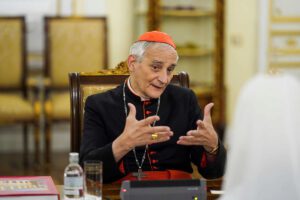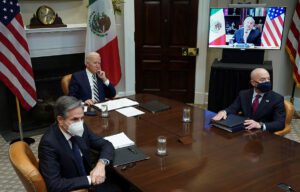VATICAN CITY (CNS) – Pope Francis’ special envoy went to Washington to explore what the Vatican’s role could be in bringing about an end of hostilities in Ukraine, said the president of the U.S. bishops’ conference.
Discussing Cardinal Matteo Zuppi’s July 17-19 trip to the U.S. capital, Archbishop Timothy P. Broglio of Military Services said the cardinal talked about humanitarian responses and avenues toward ending hostilities in Ukraine in his July 18 meeting with U.S. President Joe Biden.

In an interview with Vatican News published July 20, Archbishop Broglio stressed that the purpose of Cardinal Zuppi’s meeting was “certainly not mediation, but an opportunity to see what the Holy See could do to help in an eventual end of hostilities in Ukraine,” yet he noted that “at the present time that seems somewhat unrealistic.”
“The church is concentrating on what we do best, which of course is humanitarian assistance, so that was the primary focus of Cardinal Zuppi’s intervention,” he said.
The cardinal and the president met for more than an hour at the White House, which Archbishop Broglio said “gives an indication of how much importance the president of the United States attributed to the gesture on the part of Pope Francis to send the cardinal to the United States.”
While in the United States, the cardinal also met with Archbishop Broglio, members of the U.S. Helsinki Commission and the Senate Prayer Breakfast.
Cardinal Zuppi, archbishop of Bologna and president of the Italian bishops’ conference, hand-delivered a letter from Pope Francis to President Biden during their meeting, the Vatican said in a July 19 statement.
A July 18 White House readout said the two “discussed the Holy See’s efforts providing humanitarian aid to address the widespread suffering caused by Russia’s continuing aggression in Ukraine, as well as the Vatican’s advocacy for the return of forcibly deported Ukrainian children.”
President Biden also “shared his wishes for Pope Francis’ continued ministry and global leadership and welcomed the recent nomination of a U.S. archbishop as cardinal,” the statement said, referring to Chicago-born Cardinal-designate Robert Prevost, prefect of the Dicastery for Bishops.
Archbishop Broglio told Vatican News that U.S. Catholics have shown a “tremendous” response to the war by sending humanitarian assistance to Ukraine and organizing prayer initiatives throughout the country.
He also said he was “concerned” about U.S. cluster bombs being sent to Ukraine which he said are “indiscriminate in the victims” they create, noting that “any escalation (of the war) is going to be dangerous.”
“There’s always a danger in war that the innocent will be injured or will be harmed or can even lose their lives (on) the peripheries of a military action, and that certainly should always be avoided,” he said.
Cluster bombs refer to munitions that release smaller explosives across a wide area while in the air, making them less precise in their targeting. The Pentagon confirmed that U.S.-provided cluster bombs arrived in Ukraine July 13 and they have since been used in combat.
Archbishop Broglio expressed his gratitude for Pope Francis doing everything he can to “echo the message of peace, which is really the message of our Savior.”
“I’m very grateful for this gesture,” he said.

